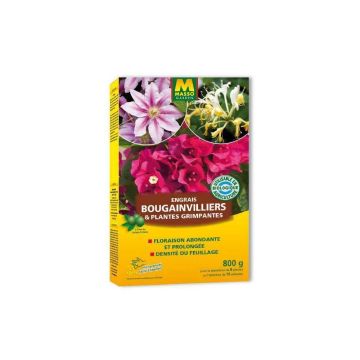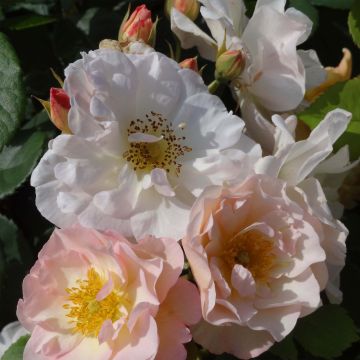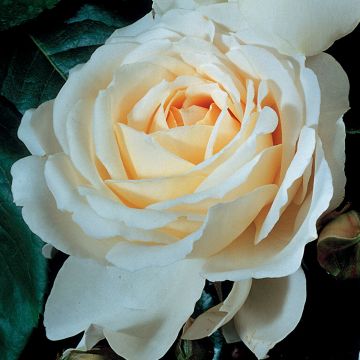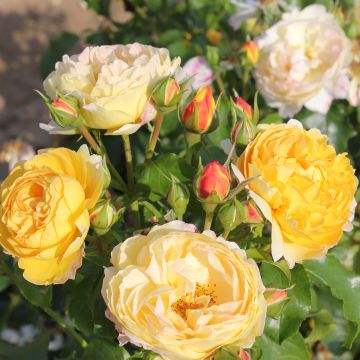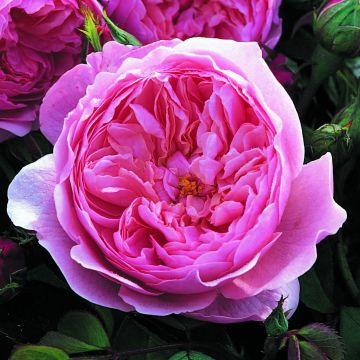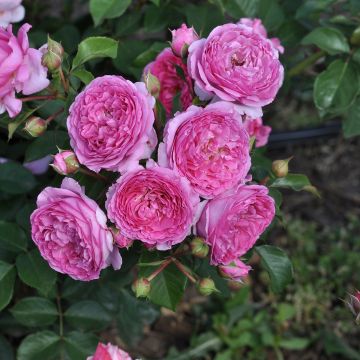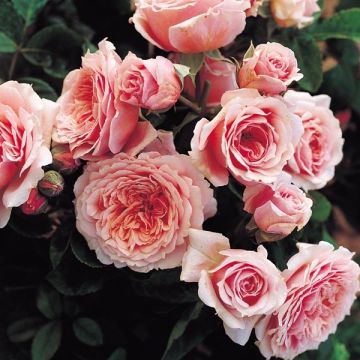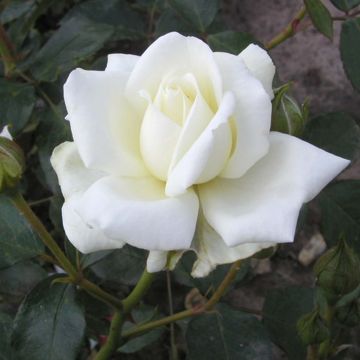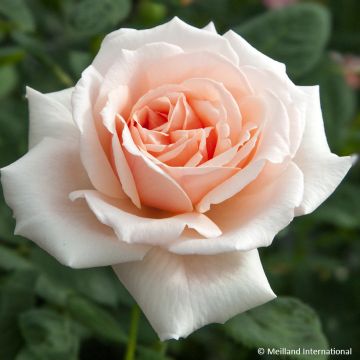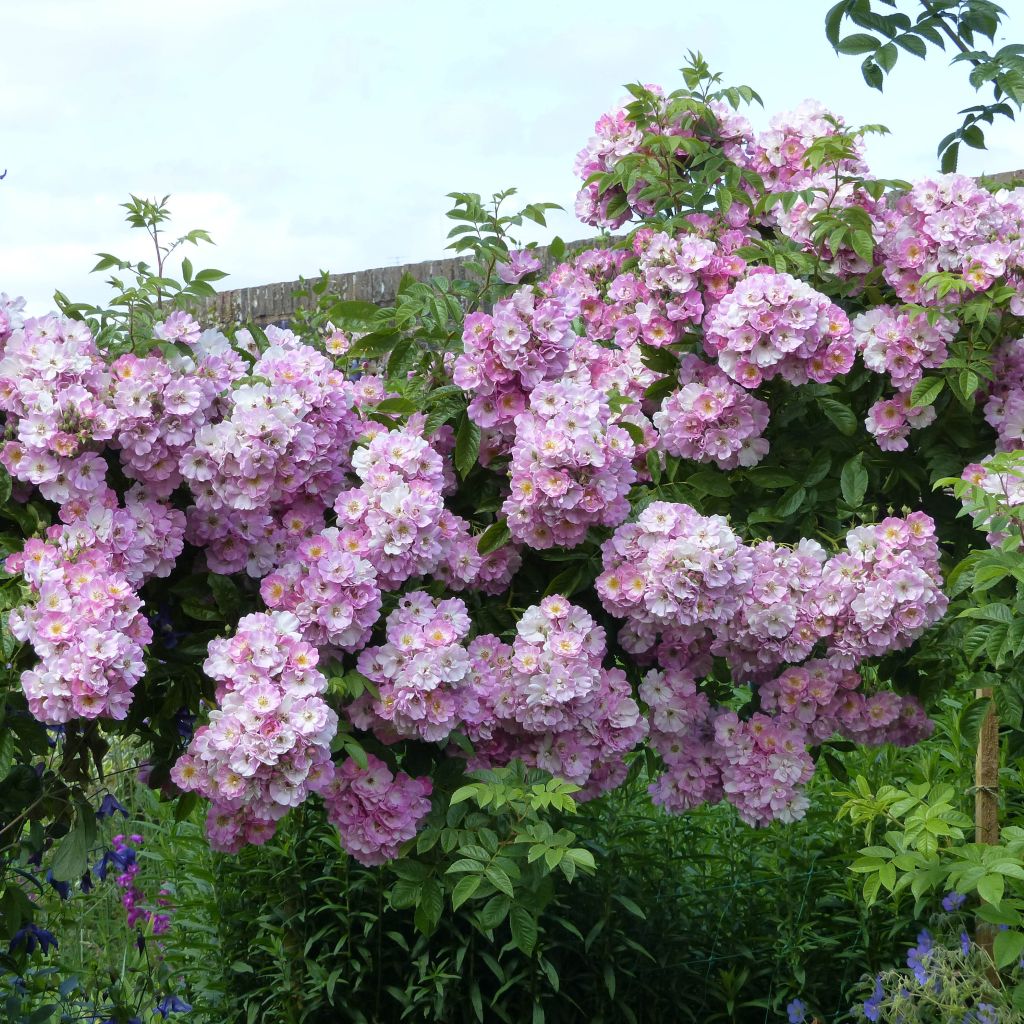

Rosa Blush Rambler - Climbing Rose
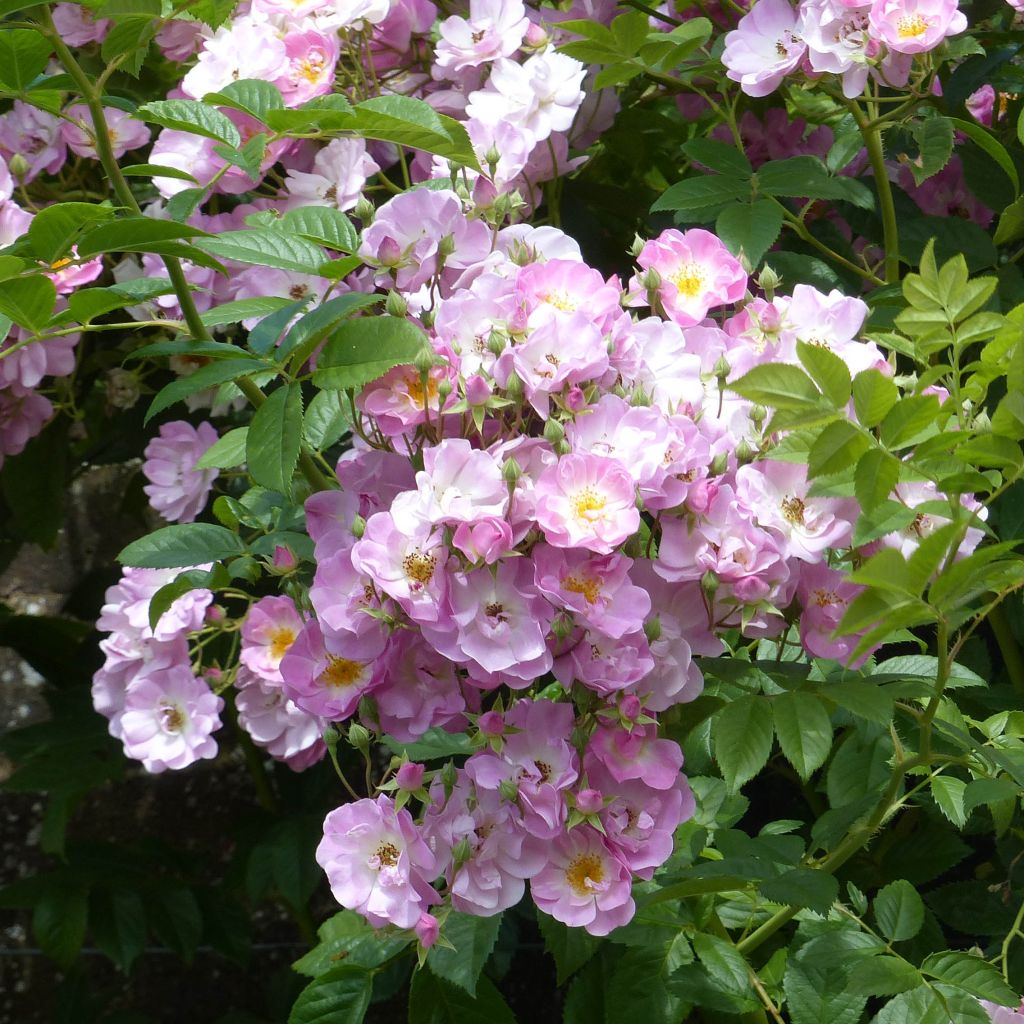

Rosa Blush Rambler - Climbing Rose
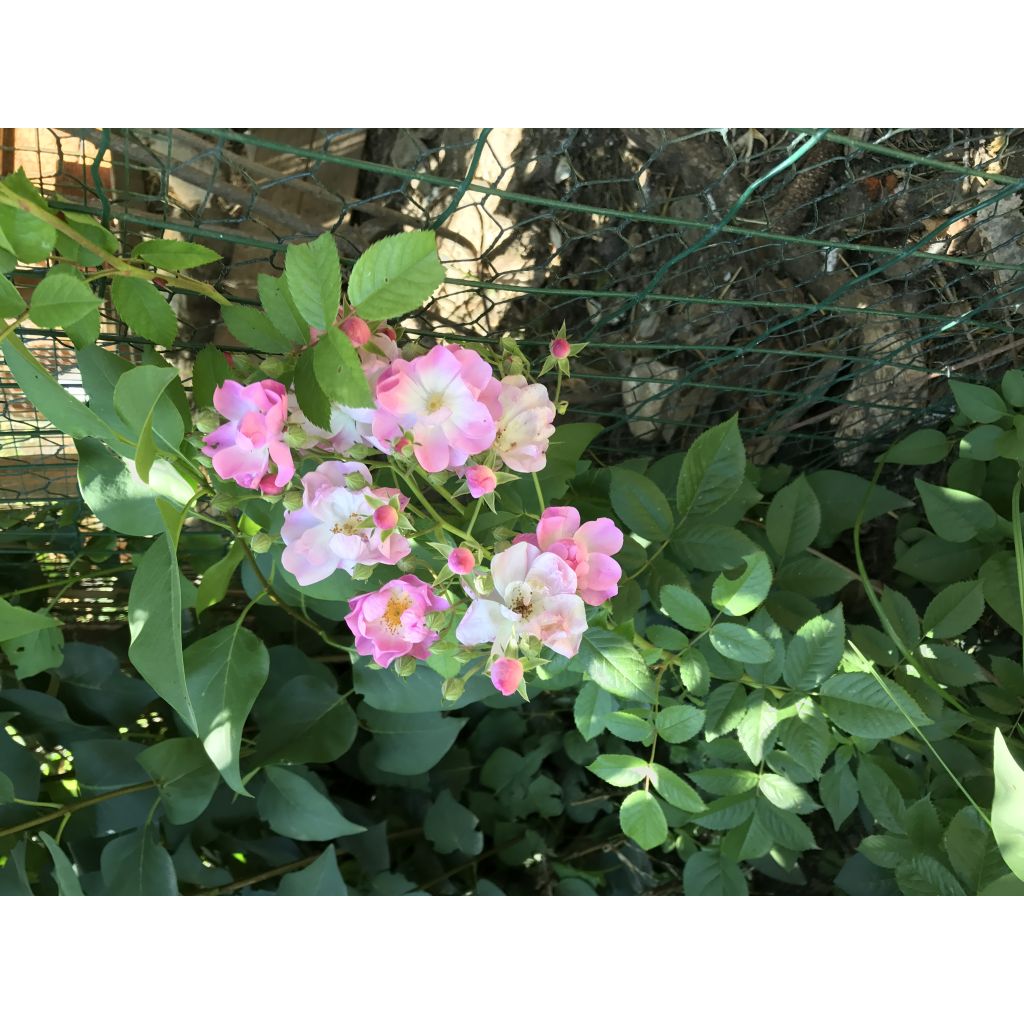

Rosa Blush Rambler - Climbing Rose
View more pictures
Hide images
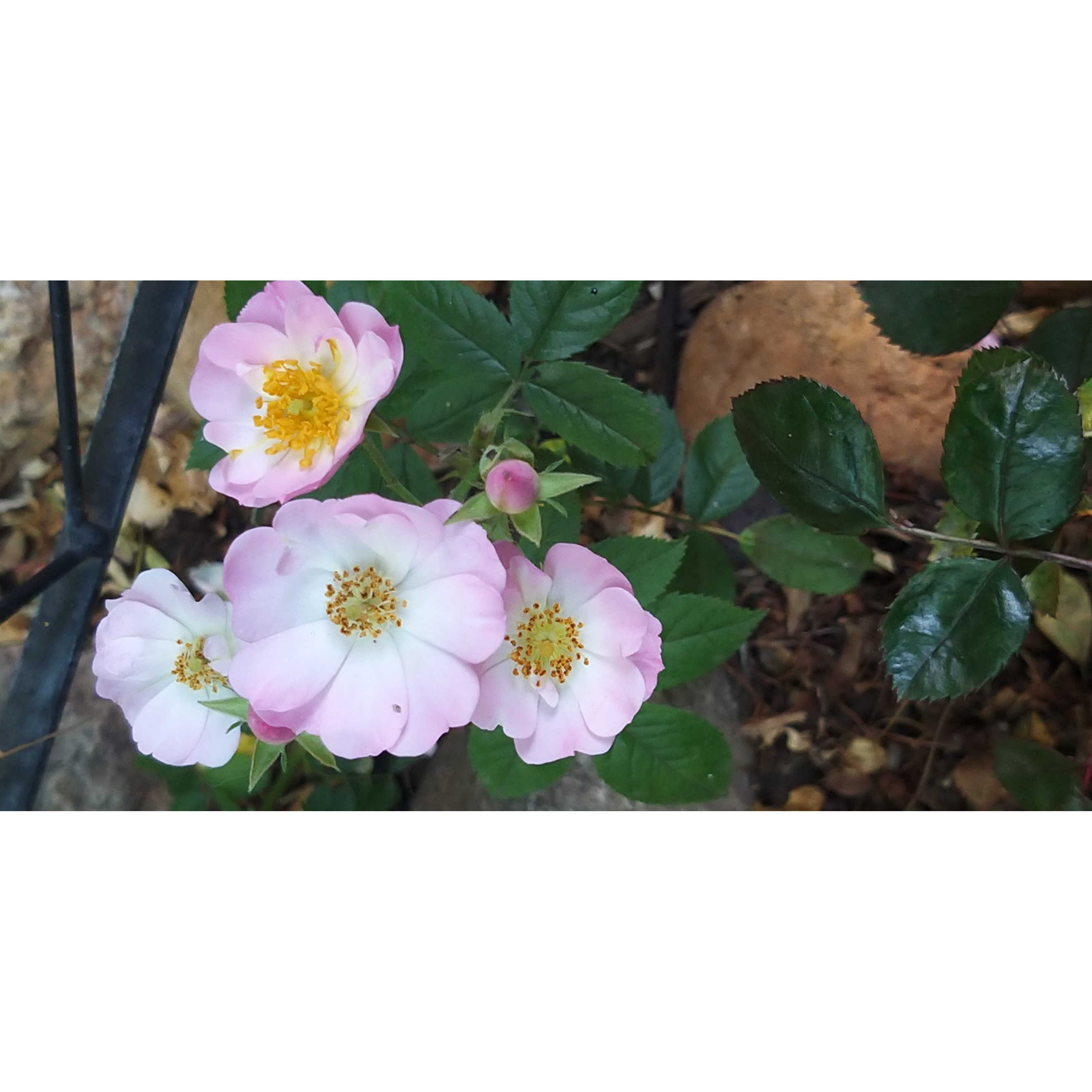
Thierry P.

May flowering - image 2
Thierry P. • 84 FR
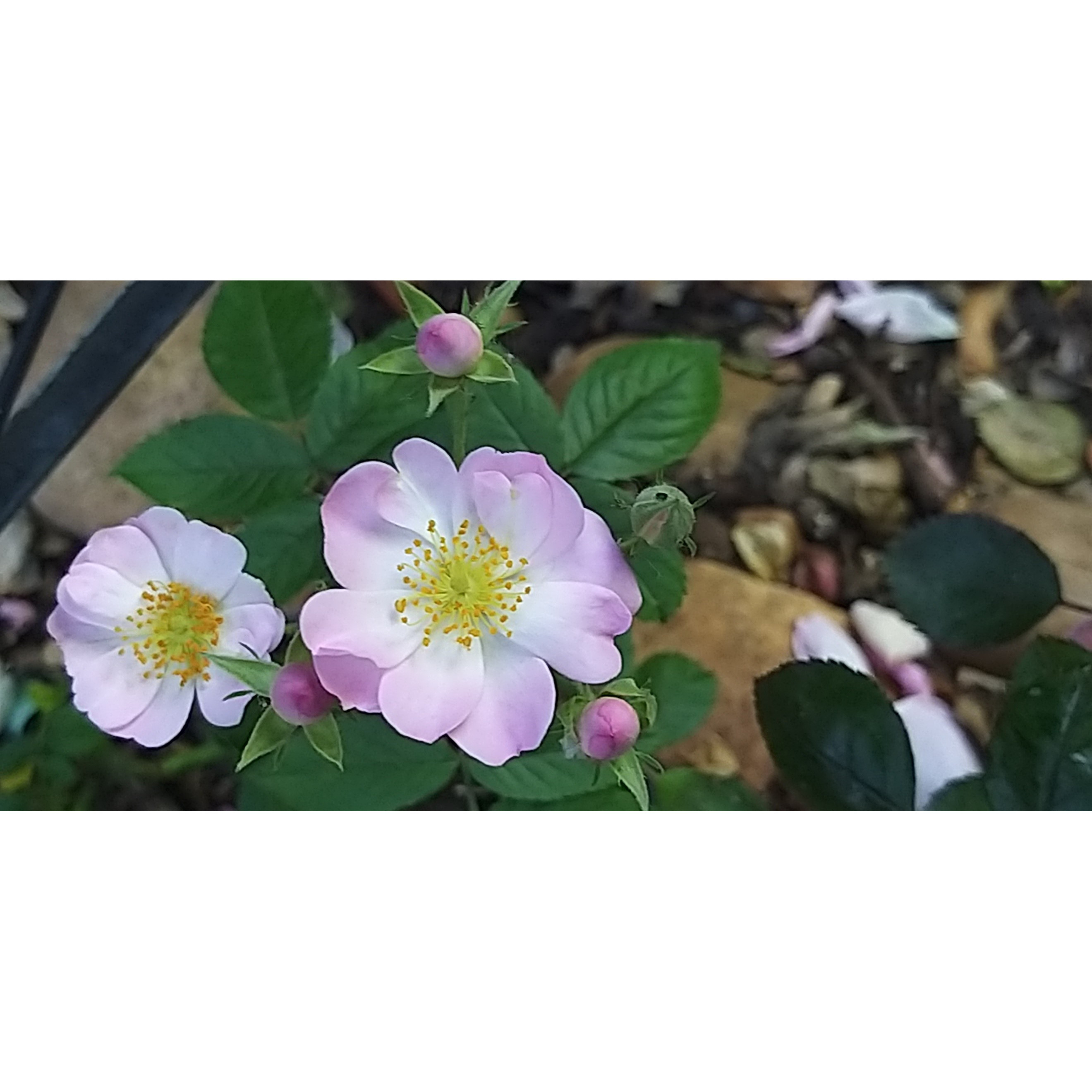
Thierry P.

May flowering - image 1 - A pleasant scent of wild rose.
Thierry P. • 84 FR
Rosa Blush Rambler - Climbing Rose
Rosa x multiflora Blush Rambler
Multiflora Rose, Japanese Rose, Many-flowered Rose, Baby Rose
Small but with nice green leaves, it seems to be already thriving.
Martine, 04/09/2024
Special offer!
Receive a €20 voucher for any order over €90 (excluding delivery costs, credit notes, and plastic-free options)!
1- Add your favorite plants to your cart.
2- Once you have reached €90, confirm your order (you can even choose the delivery date!).
3- As soon as your order is shipped, you will receive an email containing your voucher code, valid for 3 months (90 days).
Your voucher is unique and can only be used once, for any order with a minimum value of €20, excluding delivery costs.
Can be combined with other current offers, non-divisible and non-refundable.
Home or relay delivery (depending on size and destination)
Schedule delivery date,
and select date in basket
This plant carries a 6 months recovery warranty
More information
We guarantee the quality of our plants for a full growing cycle, and will replace at our expense any plant that fails to recover under normal climatic and planting conditions.

Description
Rosa 'Blush Rambler' is a sarmentous rose that is overwhelmed by a particularly generous summer flowering in very pastel shades. Although it only blooms once, its countless small semi-double and fragrant roses engulf its vegetation in July. They are gathered in generous bouquets, as blushed with fresh pink, fading to blush pink and then to white. Its long almost inermous branches are adorned with a beautiful very light green foliage. A lovely rose, with echoes of the past, that tolerates partial shade and can be trained as a climber or grown as a large free-standing bush.
This large, almost thornless rose is an English creation by Cant, dating back to 1903. This wonderful hybrid of Rosa multiflora has 'Crimson Rambler' and 'The Garland' as its parents. It easily reaches a height of 4 to 5m with a spread of 2 to 3m (6ft 7in to 9ft 10in). Its long stems are almost inermous and covered with very finely cut foliage, so light green that it sometimes appears, mistakenly, to suffer from chlorosis. Its disease resistance is moderate. The flowers of this liana, blooming only once, form in July. They emerge on short shoots from the 2nd year, as buds of a bright pink hue. They open up into semi-double cups with a diameter of 4cm (1.6in), clustered in dense bouquets along the flexible stems. Coquettish, refined, and charming, they are surrounded by a sweet musky fragrance. Fresh pink, almost vivid upon opening, they quickly fade to pale pink, then turn white, surrounding a golden stamen heart. The small fruits that delight birds in the winter are actually fleshy false fruits called hips.
'Blush Rambler' is a rose with a "Belle Epoque" charm, fully bloomed and devilishly romantic. Like other lianas, it is incomparable for filling large spaces and giving a touch of abandonment, planted above slightly too strict flower beds. It is an ideal companion for dead trees that it will revive, uncertain fences, and hideous buildings or sheds to which it gives a crazy charm. Trained on an arch, near the terrace, it will create a poetic and fragrant passage. Since its flowering only lasts for a month, it can be paired with a large-flowered clematis whose summer flowering will take over until autumn. As it is easy to maintain a bushy habit, it can also be planted in a mixed hedge, together with viburnums, mock oranges, or lilacs.
Report an error about the product description
Rosa Blush Rambler - Climbing Rose in pictures
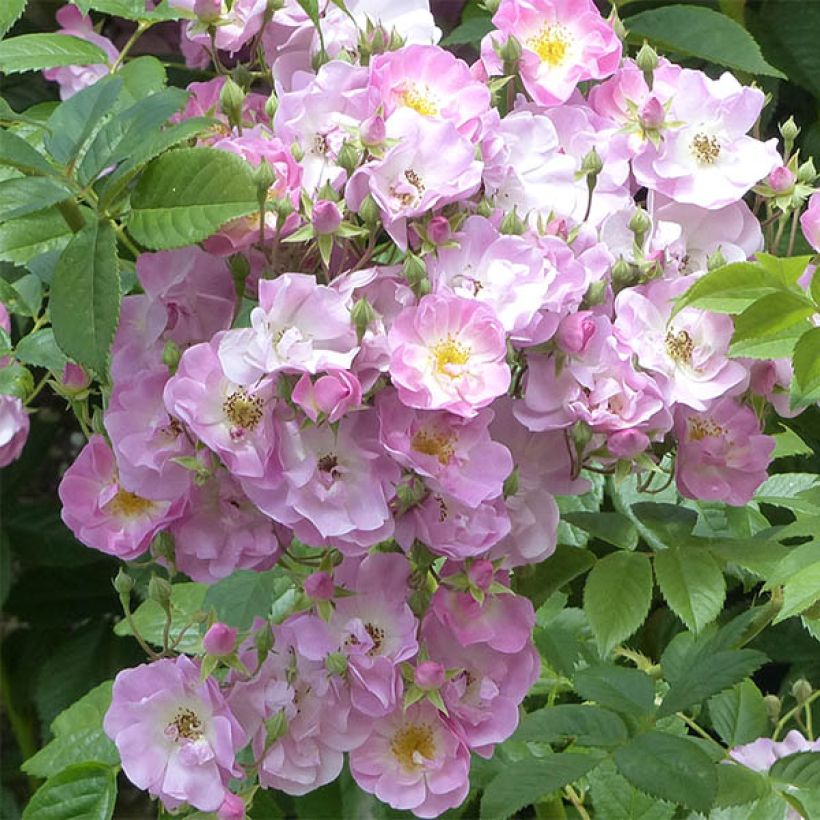

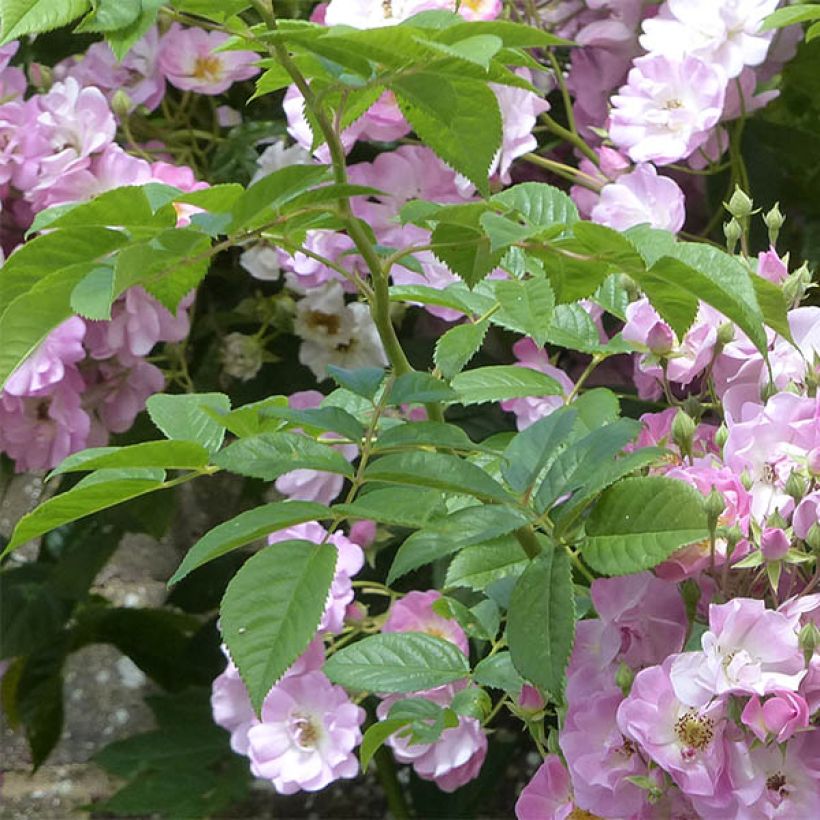

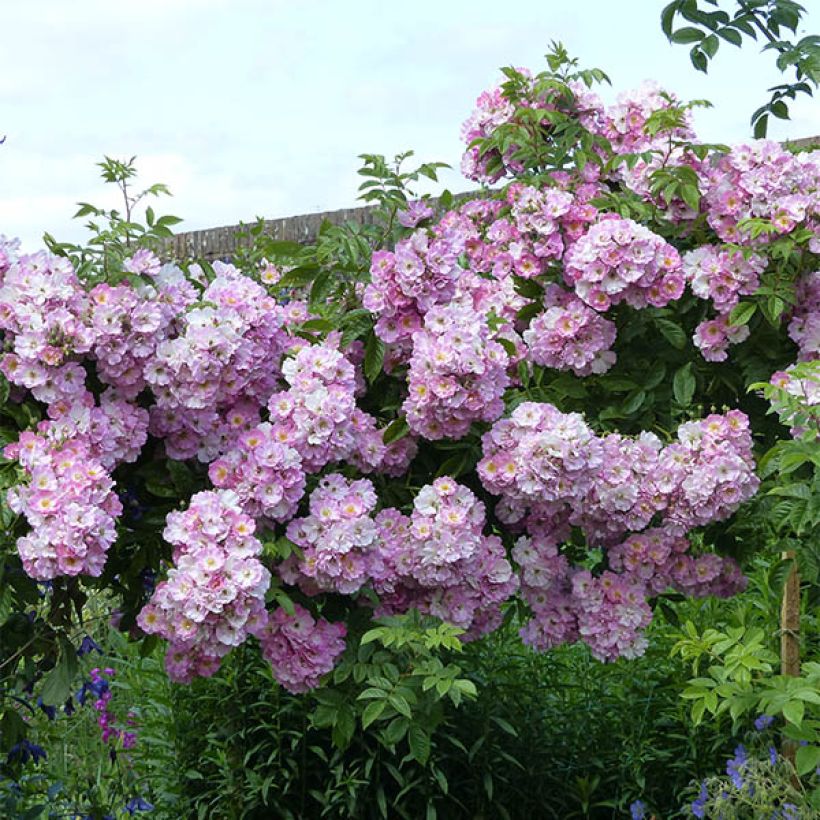

Plant habit
Flowering
Foliage
Botanical data
Rosa
x multiflora
Blush Rambler
Rosaceae
Multiflora Rose, Japanese Rose, Many-flowered Rose, Baby Rose
Cultivar or hybrid
Rosa canina Laxa (4L/5L pot, Wrapped bare root)
Planting and care
The 'Blush Rambler' rose adapts to any type of soil, even heavy or sandy, as long as the planting is well cared for and it does not lack water or nutrients. Plant it in well-worked and well-drained ordinary soil and in a sunny or partially shaded location. Plant it in autumn, never when it is freezing.
The branches that are 2 years old are the most floriferous. It is useful to reduce the stems that bloomed the previous year to 3 or 4 buds, or pruned to 15cm (5.9in). The new strong stems will be trained and the old ones removed if necessary. Quite hardy, this rose resists up to -20°C (-4 °F) and, if despite everything, after a harsh winter, the branches freeze to the ground, this liana regrows from the base in spring. It may be useful to remove dead wood in winter, to remove faded flowers if fruit formation is not desired. If necessary, in spring, after the risk of frost, a light pruning can be done. Liana roses can also be left to grow freely if you have large spaces.
If you plant a liana rose next to a living tree, the root system of the rose will compete with that of the already well-established tree. To control watering, a tip: plant the rose in a large container with a perforated bottom, at the base of the tree: the tree roots will not penetrate the container for at least a year. Remove the container after 1 year, for example by cutting one side, without disturbing the rose's root system. The rose will have had time to develop its root system deeply and will be more resistant.
Roses are often stained or unsightly in late summer, but this is not a problem for their development. These stains are not harmful to the rose, it is a natural phenomenon.
Planting period
Intended location
Care
-
, onOrder confirmed
Reply from on Promesse de fleurs
Similar products
Haven't found what you were looking for?
Hardiness is the lowest winter temperature a plant can endure without suffering serious damage or even dying. However, hardiness is affected by location (a sheltered area, such as a patio), protection (winter cover) and soil type (hardiness is improved by well-drained soil).

Photo Sharing Terms & Conditions
In order to encourage gardeners to interact and share their experiences, Promesse de fleurs offers various media enabling content to be uploaded onto its Site - in particular via the ‘Photo sharing’ module.
The User agrees to refrain from:
- Posting any content that is illegal, prejudicial, insulting, racist, inciteful to hatred, revisionist, contrary to public decency, that infringes on privacy or on the privacy rights of third parties, in particular the publicity rights of persons and goods, intellectual property rights, or the right to privacy.
- Submitting content on behalf of a third party;
- Impersonate the identity of a third party and/or publish any personal information about a third party;
In general, the User undertakes to refrain from any unethical behaviour.
All Content (in particular text, comments, files, images, photos, videos, creative works, etc.), which may be subject to property or intellectual property rights, image or other private rights, shall remain the property of the User, subject to the limited rights granted by the terms of the licence granted by Promesse de fleurs as stated below. Users are at liberty to publish or not to publish such Content on the Site, notably via the ‘Photo Sharing’ facility, and accept that this Content shall be made public and freely accessible, notably on the Internet.
Users further acknowledge, undertake to have ,and guarantee that they hold all necessary rights and permissions to publish such material on the Site, in particular with regard to the legislation in force pertaining to any privacy, property, intellectual property, image, or contractual rights, or rights of any other nature. By publishing such Content on the Site, Users acknowledge accepting full liability as publishers of the Content within the meaning of the law, and grant Promesse de fleurs, free of charge, an inclusive, worldwide licence for the said Content for the entire duration of its publication, including all reproduction, representation, up/downloading, displaying, performing, transmission, and storage rights.
Users also grant permission for their name to be linked to the Content and accept that this link may not always be made available.
By engaging in posting material, Users consent to their Content becoming automatically accessible on the Internet, in particular on other sites and/or blogs and/or web pages of the Promesse de fleurs site, including in particular social pages and the Promesse de fleurs catalogue.
Users may secure the removal of entrusted content free of charge by issuing a simple request via our contact form.
The flowering period indicated on our website applies to countries and regions located in USDA zone 8 (France, the United Kingdom, Ireland, the Netherlands, etc.)
It will vary according to where you live:
- In zones 9 to 10 (Italy, Spain, Greece, etc.), flowering will occur about 2 to 4 weeks earlier.
- In zones 6 to 7 (Germany, Poland, Slovenia, and lower mountainous regions), flowering will be delayed by 2 to 3 weeks.
- In zone 5 (Central Europe, Scandinavia), blooming will be delayed by 3 to 5 weeks.
In temperate climates, pruning of spring-flowering shrubs (forsythia, spireas, etc.) should be done just after flowering.
Pruning of summer-flowering shrubs (Indian Lilac, Perovskia, etc.) can be done in winter or spring.
In cold regions as well as with frost-sensitive plants, avoid pruning too early when severe frosts may still occur.
The planting period indicated on our website applies to countries and regions located in USDA zone 8 (France, United Kingdom, Ireland, Netherlands).
It will vary according to where you live:
- In Mediterranean zones (Marseille, Madrid, Milan, etc.), autumn and winter are the best planting periods.
- In continental zones (Strasbourg, Munich, Vienna, etc.), delay planting by 2 to 3 weeks in spring and bring it forward by 2 to 4 weeks in autumn.
- In mountainous regions (the Alps, Pyrenees, Carpathians, etc.), it is best to plant in late spring (May-June) or late summer (August-September).
The harvesting period indicated on our website applies to countries and regions in USDA zone 8 (France, England, Ireland, the Netherlands).
In colder areas (Scandinavia, Poland, Austria...) fruit and vegetable harvests are likely to be delayed by 3-4 weeks.
In warmer areas (Italy, Spain, Greece, etc.), harvesting will probably take place earlier, depending on weather conditions.
The sowing periods indicated on our website apply to countries and regions within USDA Zone 8 (France, UK, Ireland, Netherlands).
In colder areas (Scandinavia, Poland, Austria...), delay any outdoor sowing by 3-4 weeks, or sow under glass.
In warmer climes (Italy, Spain, Greece, etc.), bring outdoor sowing forward by a few weeks.































